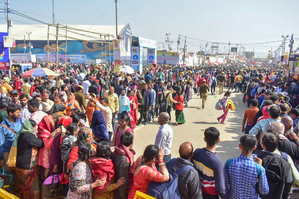Adults to be reinfected to study immune response in UK Covid human challenge trial
People aged between 18 and 30 who have previously been naturally infected will be recruited and re-exposed to the virus in a safe, controlled environment and paid around 5,000 pounds to be quarantined for 17 days at a hospital.
Healthy young adults who have previously contracted Covid-19 will be recruited to take part in a new human challenge trial to study how the body’s immune system reacts to the deadly coronavirus, for a better understanding to protect against the virus and also for more accurate tests.
The Oxford University-led human challenge trial will look at what kind of immune response can stop people from becoming re-infected and also how the immune system reacts second time round.
People aged between 18 and 30 who have previously been naturally infected will be recruited and re-exposed to the virus in a safe, controlled environment and paid around 5,000 pounds to be quarantined for 17 days at a hospital.
“Challenge studies tell us things that other studies cannot because, unlike natural infection, they are tightly controlled. When we re-infect these participants, we will know exactly how their immune system has reacted to the first Covid infection, exactly when the second infection occurs, and exactly how much virus they got,” said Helen McShane, Professor of Vaccinology at the Department of Paediatrics, University of Oxford and Chief Investigator on the study.
The study will take place in two phases with different participants in each phase.
The first phase, which will start this month, will establish the lowest dose of virus which, in approximately 50 per cent of people who have previously been naturally infected, can take hold and start replicating but produce little or no symptoms.
In the second phase of the study, expected to start later this year, all participants will be infected with the standardised dose of virus which was established in phase one. Prof. McShane said her team will begin with defining very carefully the baseline immune response in the volunteers, before infecting them.
They will then infect them with the dose of virus chosen from the first study and measure how much virus we can detect after infection.
They will then be able to understand what kind of immune responses protect against re-infection.
They will also measure the immune response at several time points after infection to understand what immune response is generated by the virus.
“A challenge study allows us to make these measurements very precisely because we know exactly when someone is infected. The information from this work will allow us to design better vaccines and treatments, and also to understand if people are protected after having Covid, and for how long,” said McShane, adding that it would also help with designing tests that can more accurately predict whether people are protected.
For phase one, up to 64 healthy participants between the ages of 18 and 30 who have previously been naturally infected with Covid-19 will be re-exposed to the virus in carefully controlled conditions.
The virus used in the study will be the original strain from Wuhan, China.
The participants will be quarantined in a specially designed hospital suite for a minimum of 17 days under the care of the research team.
They will undergo numerous medical tests including CT scans of the lungs and MRI scans of the heart.
The risks to participants will be minimised by making sure that those who take part are completely fit and well and have completely recovered from their first infection with Covid, the researchers said.
Any participants, recruited on a voluntary basis, who develop any symptoms will be given medical treatment with the Regeneron monoclonal antibody treatment.
They will only be discharged from the quarantine unit when they are no longer infected and not at risk of infecting others. The full length of the study will be 12 months, including a minimum of eight follow-up appointments after discharge.
The research team explained that a human challenge trial in medical research is a carefully controlled study that involves purposefully infecting a subject with a pathogen or bug, in order to study the effects of that infection.
“There are still many unknowns surrounding this virus and human infections studies can enable us to learn a lot about Covid-19. This study has the potential to transform our understanding by providing high-quality data on how our immune system responds to a second infection with this virus,” said Shobana Balasingam, Vaccines Senior Research Advisor at Wellcome Trust, the funders behind the trial.
“The findings could have important implications for how we handle Covid-19 in the future, and inform not just vaccine development but also research into the range of effective treatments that are also urgently needed. Keeping up the pace of scientific research and development, through crucial studies such as this remain the only way we will truly get ahead of this pandemic and bring it under control,” she said.






















